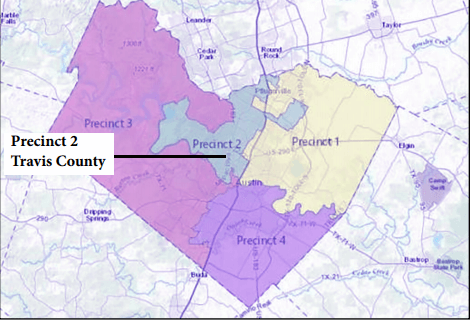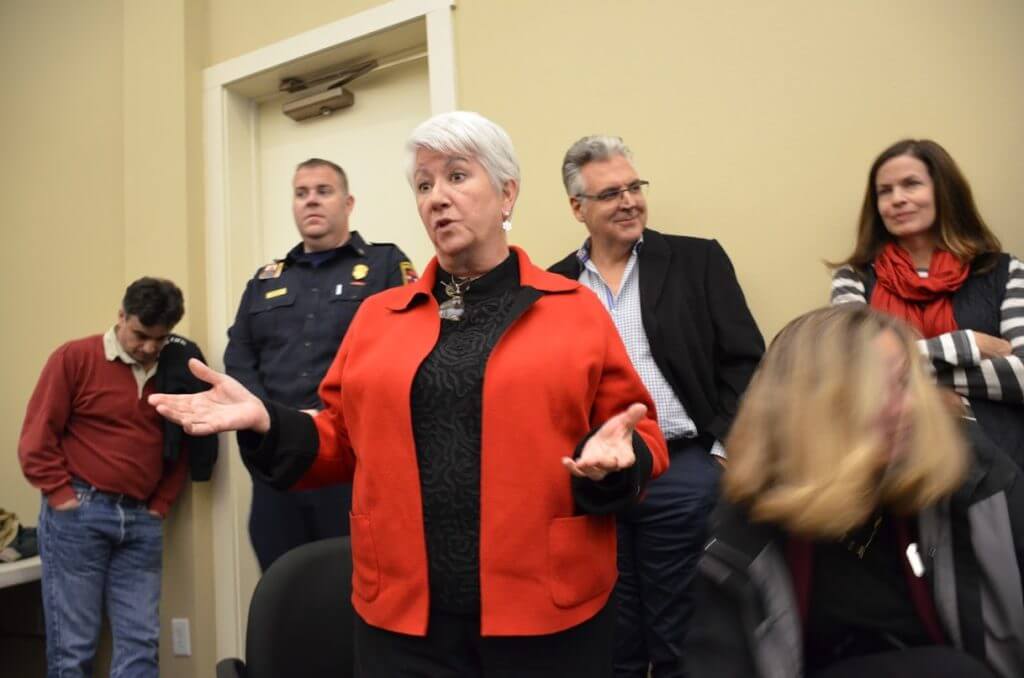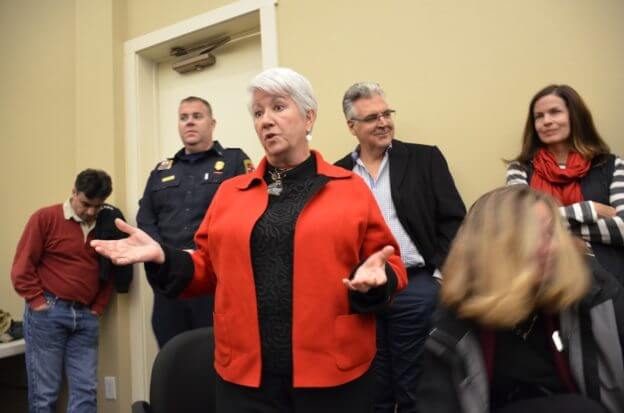 By RYAN THORNTON, Austin Monitor
By RYAN THORNTON, Austin Monitor
Travis County Precinct 2 Commissioner Brigid Shea told the Austin Monitor in an interview on Dec. 31 that she is accepting what can’t be changed, while fighting for what can.
Some of the changes she is working on are happening in Four Points including her launch of a first-ever Comanche Trail fire drill in early March. The bypass road and widening of portions of both RM 2222 and RM 620 are also in her precinct. Additionally she is involved in the plans for an emergency road out of Steiner Ranch, which is under review now.
Background
On June 24, 1988, this sentence appeared on the front page of The New York Times: “Higher temperatures can now be attributed to a long-expected global warming trend linked to pollution, a space agency scientist reported today.” The scientist was NASA’s James Hansen. His historic testimony to Congress prompted Shea’s move from Washington, where she had been working to fight nuclear weapons testing, and brought her to Austin to help form the Texas chapter of Clean Water Action.
Three decades later, no longer optimistic about the odds of halting the climate crisis, Shea is directing her efforts toward mitigating its impacts as much as possible while preparing communities to deal with climate-related disasters like wildfires and floods.
Comanche Trail pilot
One example of that work is a collaboration with the Comanche Trail Neighborhood Association to create a neighborhood fire drill pilot program. Located adjacent to Hippie Hollow Park on Lake Travis, Comanche Trail has only a single access road, leaving residents particularly vulnerable to wildfires. If the fire drill is a success in early March, Shea said the goal will be to share the procedure with equally vulnerable neighborhoods.
While the county may have little political leverage to halt climate change, Shea said local government staff members are particularly well-positioned to help residents deal with its impact.
“We have the command and control down really well,” she said. “The police, the firefighters, the EMS – they all know what to do when there’s an emergency. It’s all the rest of the individuals who are affected who don’t know what to do.”
Climate
As the county spends more in anticipation of future climate-related disasters, Shea has also worked with Planning and Budgets staff on an official policy to catalog any costs related to climate change. In the event that oil companies are found legally culpable for contributing to the climate crisis, Shea wants the monetary costs to be accounted for.
“I don’t think that the individual taxpayer should have to foot the bill for massive corporate irresponsibility,” she said.
CAMPO
In contrast to her progress at the county level, Shea has routinely found her efforts for innovative regional transportation solutions suppressed by fellow members of the Capital Area Metropolitan Planning Organization. She said the board lacks both “vision and political will” in failing to seriously consider either traditional or novel transportation modalities beyond the personal automobile.
Prioritizing the car-centric interests of rural counties, however, may finally be coming to its end at CAMPO due to a shift in leadership following the 2018 election. Shea is hopeful that Mayor Steve Adler will take over the position of chair, which has been filled by Will Conley since 2012.
“At a policy level, he was not the kind of leader that we needed for a region that should be one of the leaders in Texas on transportation policy,” said Shea. “There’s an imbalance on the CAMPO board, an anti-Austin and anti-Travis County orientation, but I think the new membership on CAMPO will even that out more and I’m hopeful that we’ll be able to produce more actually functional, effective and forward-looking long-range transportation plans.”
Roads, transportation
Meanwhile, Shea keeps busy pushing for local research into autonomous vehicles, aerial tramways (or “flying taxis,” as she calls them) and more traditional solutions like the alternative route connecting RM 620 and RM 2222 expected to break ground this month.
“When the official bodies are so dysfunctional that you can’t even get a discussion going, you have to take it elsewhere,” Shea said.
Water
Among other successes in 2018, Shea is proud of the county’s decision to convert the air conditioning cooling systems in its buildings to use treated wastewater instead of treated drinking water, saving money and millions of gallons of drinking water each year. Next on her radar is achieving the same for the University of Texas, which uses, by the commissioner’s estimation, 500 million to 700 million gallons of water a year.
“If you knitted together UT, the Capitol and some downtown high-rises, you could easily remove a billion gallons of water every year permanently from the demand side; no one would miss it,” she said.
Jail diversion
Conservation and climate change aside, the commissioner said she is also pleased with the county’s efforts at jail diversion coming into fruition this year, mostly as a result of the Sobering Center and a de-emphasis on possession of small quantities of marijuana.
“I feel like we’re really on the right track there trying to reduce the unnecessary arrests and the cost to the taxpayer, but in particular the costs to the person who’s being unnecessarily arrested,” she said.
Austin Monitor, an online, nonpartisan, 501(c)3 nonprofit publication that covers local government and politics in and around Austin.

Travis County Precinct 2 Commissioner Brigid Shea has been active in politics for three decades. Shea speaks at a Travis County meeting in Steiner Ranch on Dec. 11 about the proposed evacuation route, which shifted in scope to a permanent road in November and many residents voiced opposition to the idea.


